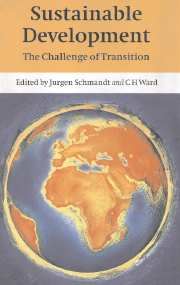Book contents
- Frontmatter
- Contents
- List of contributors
- Foreword
- Preface
- 1 Challenge and response
- 2 National self-interest in the pursuit of sustainable development
- 3 Uneconomic growth: Empty-world versus full-world economics
- 4 Population and consumption: From more to enough
- 5 Spirituality and sustainability
- 6 Leadership skills for sustainable development
- 7 The role of science: Guidance and service
- 8 Economic tools, international trade, and the role of business
- 9 Stakeholders and sustainable development
- 10 From idea to action: The role of policy
- Index
6 - Leadership skills for sustainable development
Published online by Cambridge University Press: 17 August 2009
- Frontmatter
- Contents
- List of contributors
- Foreword
- Preface
- 1 Challenge and response
- 2 National self-interest in the pursuit of sustainable development
- 3 Uneconomic growth: Empty-world versus full-world economics
- 4 Population and consumption: From more to enough
- 5 Spirituality and sustainability
- 6 Leadership skills for sustainable development
- 7 The role of science: Guidance and service
- 8 Economic tools, international trade, and the role of business
- 9 Stakeholders and sustainable development
- 10 From idea to action: The role of policy
- Index
Summary
Twenty-five years ago this month, while still an undergraduate candidate at Cornell, I came across a passage that convinced me I could become a writer of books someday. It was written by Marguerite Wildenhain, the Bauhaus potter in her superbly written book The Invisible Core, and it reads with a feeling of moral obligation even today, as follows:
There is no reason to be proud of whatever gifts one has … But there is a reason to be deeply thankful for them … The more capacity a person has, the greater and more cogent will be the moral obligation to do something honorable with what he has.
(Wildenhain, 1973)The passage does not end here, with a cliché, and elitist sense of noble obligations, but instead, returns to a more earthy and sincere point about any craft person's devotion to their way of life:
Let us look at the implication, man like animals, is by nature lazy, but the creative man would always work. He works not only because he unconsciously acknowledges his ability to do so with the acceptance of deeper human responsibility. He understands that his work-time cannot be what it is for most men, from a certain hour to another definite hour. His work will be his total life, no less. That he feels to be the least he can do to make up for the gift of abilities that he was given.
(Wildenhain, 1973)For those that have admired Wildenhain's pots, and have paused before their astounding functional beauty, you know she lived this kind of devoted life.
- Type
- Chapter
- Information
- Sustainable DevelopmentThe Challenge of Transition, pp. 113 - 130Publisher: Cambridge University PressPrint publication year: 2000

